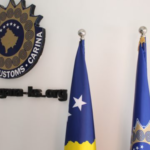For two days, Serbia’s state leadership commented on the case of Croatian singer Severina’s detention at the Serbian border, attempting to justify the situation, fully aware of the counterproductive effects of their blind adherence to absurd policies.
In other words, why would state ministers and ultimately the president comment on the detention of an individual who is neither a criminal, terrorist, nor a security threat? Severina’s case is just the tip of the iceberg of meaningless moves orchestrated by the Serbian security apparatus, sponsored by former BIA director Aleksandar Vulin.
A long list exists of regional actors, musicians, and similar figures targeted by the Serbian regime, which tried to build national security by targeting anyone who supported various protests in Serbia over the past year and a half. These individuals ended up on lists checked and detained by Serbian border guards.
Actor Fedja Štukan was also registered, detained at the airport, and ordered to return to Bosnia and Herzegovina, causing a shift in government-controlled media narratives, portraying Štukan as a threat and an opposition supporter without any justification.
Singers Selma Bajrami and Jadranka Barjaktarević had their songs analyzed and deemed undesirable, as the tabloid camarilla dismissed them.
Border Harassment
However, Severina’s case, particularly her reaction, truly unsettled the Serbian regime. After being detained at the border and questioned for several hours, Severina was allowed entry into Serbia but chose not to go, creating a panic.
It was no longer just another instance of Serbia showing off its muscles by labeling various individuals as unwanted, portraying itself as a country that everyone hates and envies—a narrative for the local audience.
Severina’s reaction was heard far and wide, especially the absurd questions she faced. Serbian authorities realized too late that Severina was not just a singer but someone who closely follows and understands the political climate and recent past.
In an attempt to manage the fallout, Serbia’s leadership first sent their team. President Aleksandar Vučić appeared on a morning show, trying to explain the incident in unnecessary detail, providing trivial information, such as calling Minister Ivica Dačić “lazy” for not answering the phone.
Dačić then gave a monologue at a press conference, declaring that all the lists used to count the unsuitable individuals would be annulled.
Next, the aforementioned Vulin took responsibility for the fact that he personally composed the texts.
Meanwhile, Serbian tabloids orchestrated an attack on Severina, labeling her with various names to minimize the damage to the local public.
The next day, RS entity president Milorad Dodik called from Bosnia and Herzegovina, insulting Severina, perhaps to support the ruling regime in Serbia.
All this because Severina only relayed her experience at the Serbian border, sending a regional message about the absurdity of denying genocide and any accusation that someone is harming Serbia. Despite the absurdity of the entire case, Severina’s voice managed to mobilize the entire Serbian state leadership.







